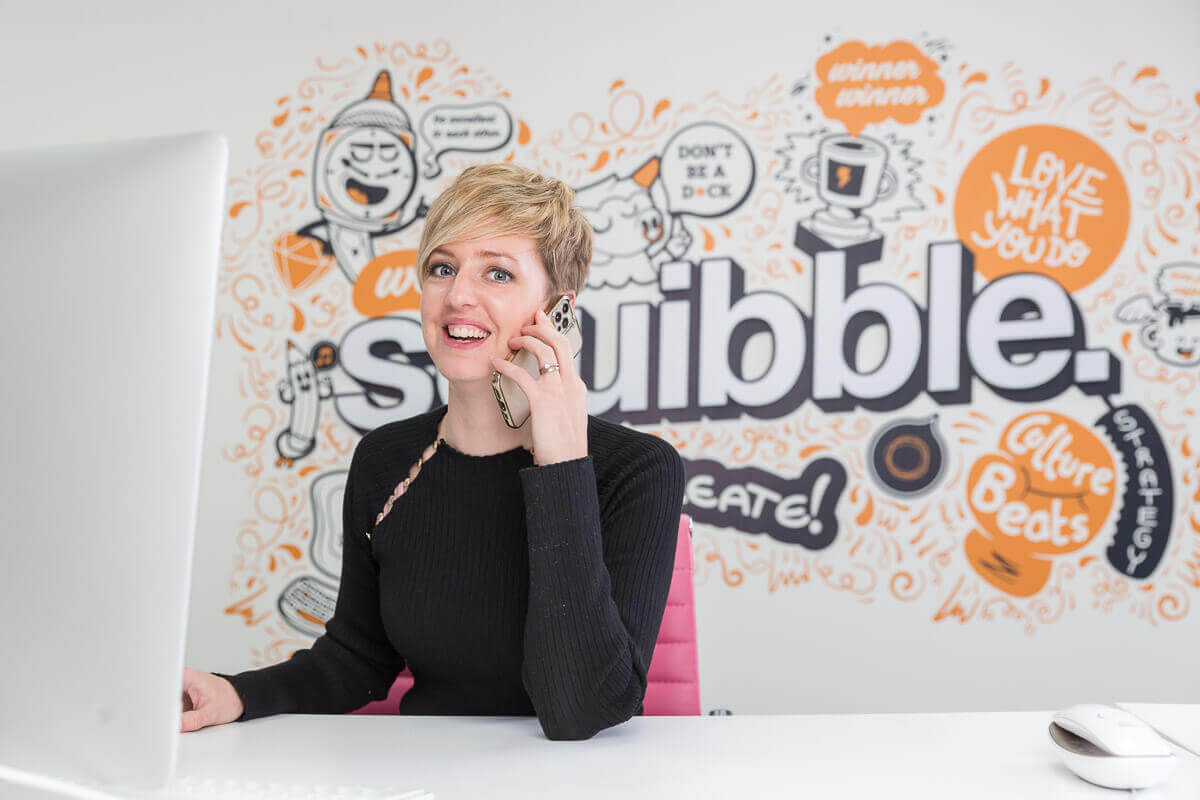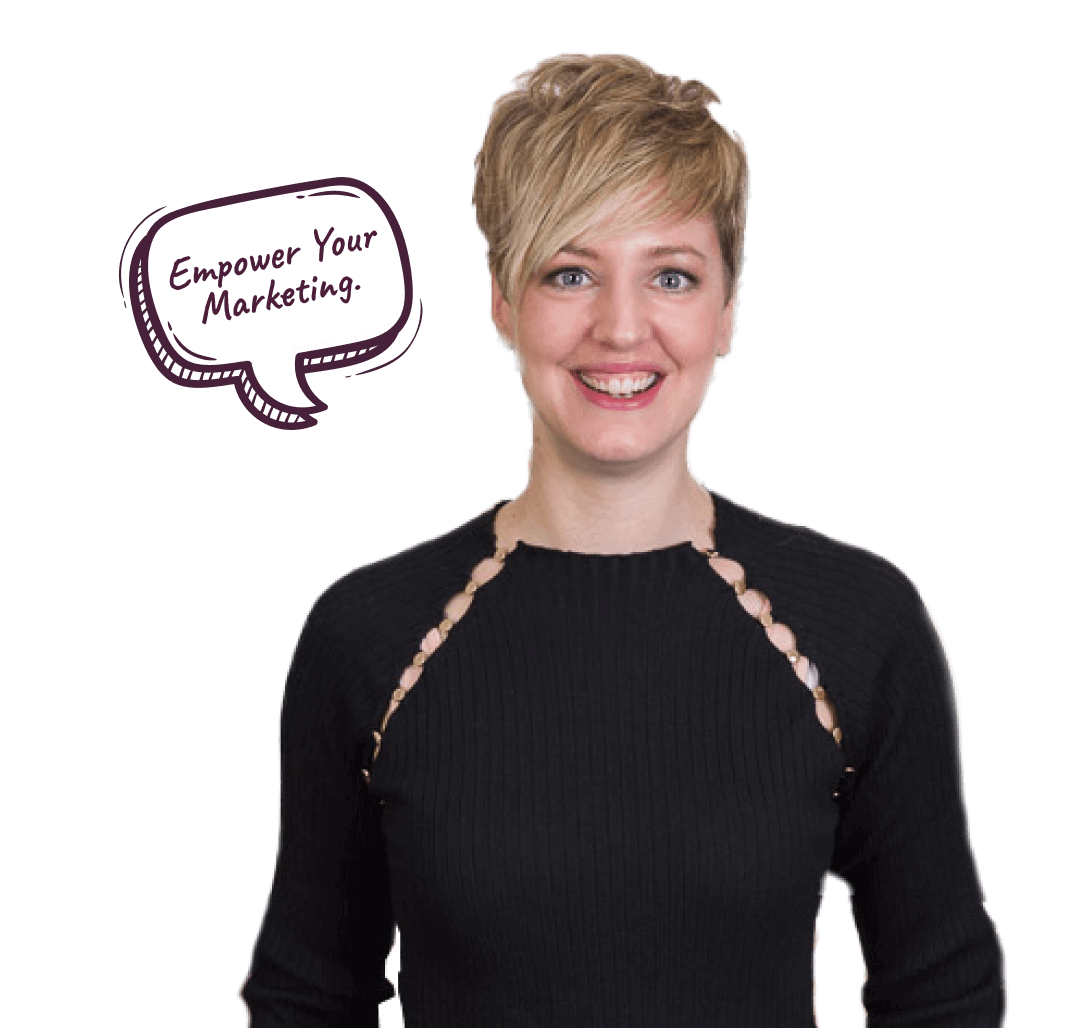A huge thank you to Dan for asking me to join him on his podcast. Below is a breakdown of what we discussed, I hope you enjoy listening to my story and journey so far.

In this episode of the ReCX Podcast I speak to Kim Leary who is a Birmingham role model for many!
We talk about Kim’s journey in to starting a business and taking Squibble to the next level and her role as Chair of Birmingham Tech Week.
Kim talks inspirationally about trusting our employees, otherwise, why hire them in the first place and how the values of Birmingham Tech Week and Squibble were important for maintaining drive and passion in her capacity, no matter what hat she wears.
One of Squibble’s processes were to work with their clients F2F to share ideas using post-it notes and eat biscuits – they’ve used tech to replace this process – check out Idea Flip!
Podcast Transcribe
Dan Rodrigues [00:00:02] Good. And hello, everyone. Welcome to the episode of the Record X podcast. This morning, I’ve got the pleasure to introduce Kimberley Leary, who is the chair of Birmingham Tech Week and also the founder of Squibble.
Dan Rodrigues [00:00:18] So without any further do, Kim, do you want to introduce yourself?
Kim Leary [00:00:27] So I kind of started in the business world about 10 years ago with Squibble, which is a Web Design and Branding Agency. And then through the work that we did at Squibble I was introduced to Yainnis and the team at Birmingham Tech Week. Obviously Birmingham Tech Week last year was a huge, huge event. We had four thousand people in one week attending 70 events at 60 different locations with loads of really, really positive feedback, comments and lots of really good collaboration that kind of came from the event. And Generally, just a really good feeling. We were able to celebrate a lot of the tech companies in Birmingham and really shout about what Birmingham does. It definitely opened up a lot of conversation. And yeah, I’m incredibly proud to be part of it. I think Squibbles supported quite a lot in terms of the initial branding messages, the social media content, putting the marketing collateral together. Yiannis was actually very prolific and he created all of the website and the branding. And we were able to take what he had started and take it further. So we do have a new logo, which James at Squibble did. But because of COVID 19, it meant that there’s a lot of stuff that we wanted to do, that’s been put on hold or is being deferred. So it does make it a difficult time. And it’s frustrating because we had so many plans for this year. And it’s unlikely that they’ll be able to go ahead in the form that we wanted, but certainly, as ever, there’s lots of ideas and lots of thoughts about what we could do next. I guess with that, we’re kind of up against it after last year.
Dan Rodrigues [00:02:46] Yeah. Well, being such a success, it’s always difficult when you put pressure to make something equally good or even better. Yeah, there’s always going to be that pressure. Well, let’s rewind to just Squibble, because you’ve got quite an interesting story as to how Squibble was formed in terms of your personal story.
Dan Rodrigues [00:03:09] And then we can go into Birmingham Tech Week, because I’ve got a couple of things to say in terms of how we just start swapping emails and how that will unfold.
I mean, I didn’t ever really plan to get into business and to start a company, or to start an agency.
Kim Leary [00:03:24] Yeah. I mean, I didn’t ever really plan to get into business and to start a company, to start an agency. It all happened really because, so I graduated in 2008, which is obviously when the markets had crashed. Marketing roles were always the first to go. And I left university with such an air of confidence, thinking, I’ve come out uni, I’ve got all these qualifications. Know what I’m doing but at every point. It was always “you need more experience”. And so I thought nobody really wanted to take a risk on me.
Kim Leary [00:04:06] So I decided to start doing work for friends and family and kind of really built up a portfolio of work. My husband said to me, Kim, you need to make a decision on what you’re doing. You are applying to jobs. You are freelancing. You are working full time. It’s time to really focus in and make a decision. So I did. Kimberly Jane Design was born. And then after the first couple of years, I felt like I needed to be in the city. Whereas I was based in Tamworth, and I really felt like Birmingham had more to offer for what I needed. So we moved to Birmingham in 2012.
Kim Leary [00:04:55] And got well involved in the world of networking and any excuse for a glass of wine and a nice lunch. But yes, certainly it wasn’t something that I’d set out to do. But I have thoroughly enjoyed all of it. And, you know, we’re kind of continually growing and changing. In 2016, we rebranded as Squibble. The name derived from the fact that I Squibble notes and drawings. But Squibble is in the true sense of the spelling was taken. So Squibble was born in 2016 and really it catapulted us into a different marketplace. We’re only a lean team, but we do sit alongside some of the biggest agencies in Birmingham. And we certainly hold our own.
Dan Rodrigues [00:06:09] And then how did you get into the Birmingham Tech scene?
Kim Leary [00:06:19] So I had a conversation with Mark O’Sullivan and it was a really, really, really good conversation, to be honest, Stu Wood was also involved. And we just had so many ideas.
Kim Leary [00:06:35] Mark, basically, shared the concept of tech week. I hadn’t met Yiannis at that point, so we shared the concept, shared the ideas, the conversation that we had was just really energetic and it felt really good and really positive. So they approached me after that and asked if I would attend a board meeting to see if there was any synergy, see if there’s anything that we could do together. And so that was really my first introduction to the team. A lot of people sitting round the table I hadn’t met before, but just there was a general feeling of positivity. And it was exciting. So my view initially was that this could be such a big idea that we really need to have focus and because there is quite a large team everybody needed to be saying the same thing and having the same conversations. The first piece of work really was to go and develop some key messaging to make sure that we all talked about the same things and we always brought it back to the same point, which in the end became celebrate and connect and inspire. And so it’s always everything that we do always comes back to those pieces. So, yeah, that was really my first kind of introduction into Birmingham Tech Week. And I mean, we had three months. So the board was really engaged. We have quite a big network among us. And I think because we were all very clear on what the end goal was and what we wanted to achieve. Naturally, people wanted to get involved.
Dan Rodrigues [00:08:55] Yeah, well, it was one of our businesses goals. First goal was to do a talk at Birmingham Tech Week. And I didn’t really know how it even worked. And I, I didn’t know that you ran Squibble.
Dan Rodrigues [00:09:08] I dropped you over an email thinking that, you know, you were only working for Birmingham Tech Week, and that was all you did. And so I didn’t even know you that well.
Kim Leary [00:09:39] For me, Birmingham Tech Week was the sole focus and I didn’t ever want to be seen to be pushing Squibble.
Dan Rodrigues [00:09:53] Yeah, it’s difficult to know.
Dan Rodrigues [00:10:00] It’s really difficult to separate that, you know.
Dan Rodrigues [00:10:04] And what I always get a sense for you and tell me if I’m wrong to your point is similar to the way we operate, is that if we are committed to a community focus, that’s what we’re doing.
Dan Rodrigues [00:10:14] We’re running an event that’s dedicated to that channel. That’s what we’re doing. We’re not using it as a marketing platform for our business. That makes sense. Yeah, I think that’s well, what I like about you and what you were trying to do is that you actually kept them separate. That was your goal.
Kim Leary [00:10:32] Yeah. Because I think people are very switched on. And if it becomes a marketing subscription, it’s wrong. It’s not right. BTW was separate.
Dan Rodrigues [00:10:47] That’s what I was going to talk to you about your company’s values, because I know we touched on this a couple of times, a week ago.
Dan Rodrigues [00:10:53] But Squibble, in terms of where we’re at at the moment to talk to us about what it was like when lockdown was occurring when you were gearing up to that infamous day. What happened?
Kim Leary [00:11:11] So in all honesty, because we are a small team, we’re already quite set up for working remotely anyway. Literally, we need a computer and a decent Wi-Fi connection, and that’s pretty much it. We’ve got all of our documents already saved in the cloud. So we don’t have problems with transferring files. We use it all online and stored in the cloud. So really, we just need somewhere to login. It doesn’t even need to be our own computer. It can be a separate computer if need be. So from that point of view, we were I think I can’t remember the days of it now, but was it Monday? We went into lockdown. So we’d already taken the decision on the Thursday and Friday, I think. So, yeah, we were kind of working from home on that Monday anyway. And. I think the only thing we needed to figure out quite quickly was how we could deliver digital sessions. So typically at the start of a project, we will sit around a table. We’ll get all the Post-it notes out and we will have a conversation and we will just get Post-it notes up on the wall that just detailed the business that we’re going to work with, in their words, in their language, the things that they say we put on the wall. That was the only thing that we obviously couldn’t do. But I found a really nice piece of tech that’s so simple. Called IdeaFlip. And literally, it’s a screen with Post-it notes for dragging and typing on. So we set up individual boards that kind of cover the questions that we would generally need answers to. And then just move on. And it’s collaborative so everybody can log in. Everybody can type at the same time, move them around. So it’s quite interactive. Yeah. Well, yeah, we were able to within 48 hours, really kind of carry on as before. It worked quite well and actually some of the feedback that we had is that they felt the sessions were more focused. You don’t want to hang around on Zoom all day. I think the call was more focused and it was more successful in that way. But we just couldn’t share biscuits.
Dan Rodrigues [00:14:38] So in terms of the engagement aspect, how big is your team? I mean, how many employees have you actually got, Kim.
Kim Leary [00:14:46] So three again at the moment.
Dan Rodrigues [00:14:50] So what’s the engagement been like with them and what have you done to, to say check-in or sort of address what’s been going on, home-based work also in terms of the whole mental wellbeing space.
Creating brands, the thought that goes into developing concepts they’re all ideas that stem from inspiration that’s all around us. And because we’re obviously not able to do too much at the moment and we’re in our own bubbles, keeping that inspiration and keeping that creative thought going is perhaps more of a challenge.
Kim Leary [00:15:09] And it’s a big responsibility. I mean, generally, I am not one for micromanaging anyway. So largely whoever is working on a project, they know what milestones are needed. And we have the opportunity to have conversations. Things need checking. But generally, I don’t sit and look over their shoulders and check out what that what they’re doing. I think that you know, the team is experienced enough that they don’t need that. And actually, I’m not kind of comfortable with that, but everybody knows that we’re available for each other to share ideas and to bounce things around. And naturally, it just happens because the creative process is it involves talking and involves questions and there’s always going to be a conversation. So naturally, we are always talking. We are always sharing ideas and thoughts. It’s not perhaps as structured as it was in the office, but it’s more in the moment, I guess. So I think from that point of view, it good. And I think that everybody still feels happy. I think the issue is that we are an ideas company. We sell and we trade on ideas. Creating brands, the thought that goes into developing concepts they’re all ideas that stem from inspiration that’s all around us. And because we’re obviously not able to do too much at the moment and we’re in our own bubbles, keeping that inspiration and keeping that creative thought going is perhaps more of a challenge. Even before lockdown, we spend one full day a week training and through training, it all develops ideas. It always makes you think, oh, why don’t I try that? Why don’t you try that? And so I think that naturally way we’re kind of still surrounding ourselves with inspiration and ideas. So one of the things that I did when we went into lockdown initially is I sent out food hampers of treats and just yummy things to help with everybody’s morale a little bit, really. Which I think was greatly, greatly received. And I just think. Now, even though we’re not together, there’s still things that we can do as managers or leaders to make sure everyone’s okay. The other big aspect is literally asking the question, how are you? You know, we’ve got such an open culture that really feels comfortable to say, and if you’re having a bad day, it doesn’t matter to say. So I would definitely say it’s about not applying too much pressure. I trust my team implicitly. So if we set a deadline and for whatever reason, that deadline needs to be changed, it’s not through lack of work or through, you know, just generally sitting about and not doing anything. There’ll be a genuine reason for it. We’ve always got a good relationship with our clients that if something like that does happen, they’re probably aware. We’ve probably already been having conversations. And by that point, they’re expecting that something needs to change or there’s other factors at play. I think we’re lucky in that sense that we do get to work with some really good teams and some good companies that are always understanding, particularly in this environment. There has to be some give and take.
Dan Rodrigues [00:19:26] Absolutely. Absolutely. And evidently it’s been well received by your team. Have you been doing anything collaboratively? That’s not been work-related? The old pop quiz.
Kim Leary [00:19:41] So we haven’t done a work pop quiz.
Kim Leary [00:19:51] We did to them at the beginning with friends. We did them every week. Yeah. I’ll be completely honest. It gets to eight o’clock and I’m done. I feel like we’re back in starts at mode to be honest. I feel like it’s a lot of work and obviously, with kids as well in the day it’s trying to split out times, fit in school learning, and then the evening tends to be catching up with e-mails or where I get a big chunk of time, or I can just sit and work and focus without distractions.
Dan Rodrigues [00:20:30] I feel that way too.
Dan Rodrigues [00:20:40] I feel like we’ve been probably working more but I think being more productive too. I think people are a lot happier as to where they are in their lives. And you know what that’s like as opposed to working in the office. Losing 45 minutes in the morning, traveling and commuting, people are a little bit more productive in terms of where they’re at with stuff.
Kim Leary [00:21:01] Yeah, I know it’s a big concern for a lot of people that working from home and whether you would be less productive. But I have worked from home in the past quite regularly. I know probably more productive, but don’t get sidetracked by the washing. Don’t get sidetracked by the dishwasher. But I think as time is going on, it’s getting more difficult. I’m ready to probably break up a little bit and escape the walls of this office.
Dan Rodrigues [00:22:10] How flexible will you be in the future with remote working?
Kim Leary [00:22:12] So we do already try to be fairly flexible. I don’t think we have the right framework in place yet though. So we’ve got a bunch of laptops in the office that everybody’s free to take out. Go to a coffee shop, go wherever they want, and work remotely if they feel they need to get out of the office. It’s not something that anybody really took up, my staff included. We are going to try and put something more solid in place to allow people to do that. Having spoken with the team, the general feeling is that, yes, they actually do want to be in the office. It would be nice to try and achieve practical balance and more flexibility, but they do enjoy being in the office. And actually, you know, the creative nature of what we do lends itself well to sitting together. So I can’t say that we’re going to have a structured your working from home on a Tuesday or a Friday. It’s I don’t know if we can be that specific, but certainly putting something in place that enables people to work from home, if that’s what they want to do. It’s, I guess, understanding. So if, for example, I say tomorrow, I’m going to work from home. What does that mean? Is it going to impact on a conversation that we need to have? Or a meeting that’s planned? So I think, like with anything, it’s always going to come back to common sense. And, you know, it has an impact.
Dan Rodrigues [00:23:57] Absolutely. That’s that’s it. Let’s just be grown up about it and let’s just have a bit of common sense. But I think it comes down to your first point. You evidently trust your staff to deliver, which is what it’s about. And I think if we don’t, I think it’s a bug in the balance about empowerment and trust, but also being grown up about it and making sure it’s still going to help.
If you don’t have trust, then there’s something wrong.
Kim Leary [00:24:20] Yeah, trust is everything for me as a person and a business owner. If you don’t have trust, then there’s something wrong. Trust is the best foundation for everything and I trust them to make the right decision if they’re researching, I trust the timelines that they give. I trust the decisions that they make. And I have to know but I understand that lots of people are very wary about that. But it’s quite liberating when you get into a position where you do trust and it opens up a whole world of possibility and opportunity. At the end of the day, we employ our team members to do a job that we want them to do. So if we don’t trust that, they can’t do it, then really, why employ them and why did you hire in the first place?
Dan Rodrigues [00:25:14] Exactly. Exactly. It’s yeah, it’s refreshing. It’s refreshing to hear.
Dan Rodrigues [00:25:21] And so what’s been the toughest challenge for you personally since working from home in the last eight weeks, seven weeks.
The biggest thing for me is guilt, the guilt of working in the day or working nights. Not being able to play 100 percent of the time with kids.
Kim Leary [00:25:32] The biggest thing for me is guilt, the guilt of working in the day or working nights. Not being able to play 100 percent of the time with kids. And they’re still quite young. One’s four and one’s nearly two. So they are really young. They still do need a lot.
Dan Rodrigues [00:27:49] Yeah, you know, you’re not the only one I think is refreshing, although I know people will be able to probably listen to this and actually probably hopefully reflect on that, you know because there’s a lot deeper going on here.
Dan Rodrigues [00:28:00] But it’s been nice because I’ve been able to spend more time with my children. And, you know, I read something the other day where actually you don’t just watch. Sometimes kids need is not actually then focus of you. Should they just want you to be present. So just being in that room. Yeah. It means more to them sometimes.
Kim Leary [00:28:32] Yeah. And that’s all well and good. But as soon as I get the computer out in the lounge then it will sticky fingers all over the keyboard.
Dan Rodrigues [00:28:47] Let’s just go back to Tech Week. Now, I know that you’ve been holding up your webinar here and there over the last few weeks. It’s been really, really good. So people can still see that you’re present. But what are the plans? What’s going on if you’d have to give too much away. But, I mean, what’s going through your mind so far?
Kim Leary [00:29:07] Yeah. So I think really things are changing on a daily basis. The only thing that is probably pretty certain is that we will not be holding a large scale event with 4000 thousand people like we did last year. It’s just not going to be feasible. And generally, I don’t think people would want to do that. I don’t want to sit in a room full of, you know, hundreds of other people. I’m sure I’m not alone in that thought. We are still fleshing out ideas and we still very much in research mode and trying to get a good feel for what people might want to do during that week, regardless of what happens, there will be some form of event, whether that’s online, whether that’s the content or whether or not there’s something else that we can do.








